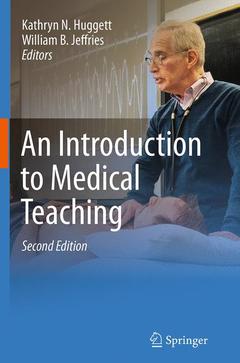Description
An Introduction to Medical Teaching (2nd Ed., 2nd ed. 2014)
Coordinators: Huggett Kathryn N., Jeffries William B.
Language: English
Subject for An Introduction to Medical Teaching:
Keywords
Assessment; Instructional Design; Learning; Medical education; Teaching
Publication date: 09-2016
Support: Print on demand
Publication date: 07-2014
271 p. · 15.5x23.5 cm · Hardback
Description
/li>Contents
/li>Biography
/li>Comment
/li>
Preface.- Facilitating Student Learning.- Teaching Large Groups.- Teaching in Small Groups.- Flipping the Classroom.- Problem-Based Learning.- Team-Based Learning.- Teaching Clinical Skills.- Teaching with Simulation.- Teaching with Practicals and Labs.- Teaching with Technological Tools.- Teaching to Develop Scientific Engagement in Medical Students.- Designing a Course.- Establishing and Teaching Elective Courses.- Designing Global Health Experiences.- Assessing Student Performance.- Documenting the Trajectory of Your Teaching.- Teaching as Scholarship.- Appendix: Additional Information About Medical Education. Index.

